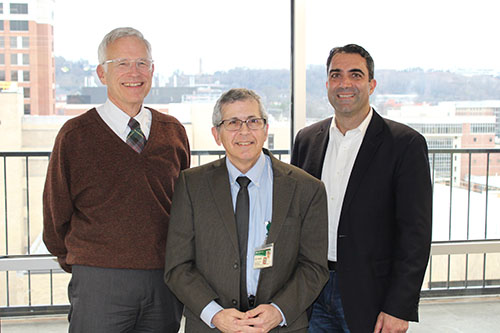 From left to right: Seth Landefeld, Stu Frank, and Mike MugaveroThis week, leaders from across UAB gathered to honor Stuart J. Frank, M.D., at the naming dedication of the Stuart J. Frank, M.D. Conference Room in the Boshell Diabetes Building (BDB). Hallways were lined with cherished colleagues, friends, and mentees.
From left to right: Seth Landefeld, Stu Frank, and Mike MugaveroThis week, leaders from across UAB gathered to honor Stuart J. Frank, M.D., at the naming dedication of the Stuart J. Frank, M.D. Conference Room in the Boshell Diabetes Building (BDB). Hallways were lined with cherished colleagues, friends, and mentees.
Department of Medicine Executive Vice Chair and Professor Emeritus, Stuart J. Frank, M.D., joined UAB in 1991 and has had an illustrious three-decade career as a physician-scientist.
Colleagues describe Frank’s legacy at UAB both inspirational, compassionate, and jovial. Frank has seen the leadership of many deans, division directors, and administrators. He feels like it has been an honor to watch UAB expand over the years, and he looks forward to continuing to watch its growth.
Though his research responsibilities have now become more advisory, Frank will maintain his thriving endocrinology clinic at the Birmingham Veterans Affairs (VA) medical center. He will also continue serving in the Division of Endocrinology, Diabetes, and Metabolism, having served as its Division Director from 2007-2018.
A fitting dedication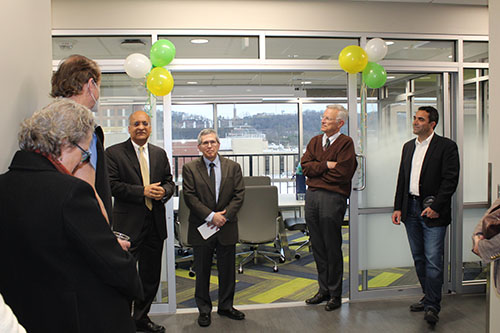 Speeches given for Dr. Stu Frank
Speeches given for Dr. Stu Frank
“The conference room with the best view at UAB” is how many describe the new space. With an expansive window overlooking the city of Birmingham and a balcony that opens to the iconic Vulcan statue, it is easy to see why.
Like its namesake, the conference room is welcoming, opening, and transparent. It is outfitted with sliding doors, comfortable seating for 15, and teleconference technology, making it the star of the 8th floor.
Dedication speakers included Heersink School of Medicine Interim Dean and UAB Medicine Interim Senior Vice President Anupam Agarwal, M.D., as well as Department of Medicine Chair Seth Landefeld, M.D. Director of the Center for Outcomes and Effectiveness Research and Education Michael Mugavero, M.D., shared that in order for the BDB 8th floor to become the modern office space it is today, Frank selflessly donated his former lab space.
“It is truly an honor, and so moving, to have this conference room dedicated to me,” said Frank. “The space was previously used as a learning environment, where scientists met to research and plan, which is similar to how the space will be used now. It’s also a place where I spent most of my investigative career, so it fits.”
Now, the floor is outfitted with offices and conference rooms for the Center for Outcomes and Effectiveness Research and Education, Department of Medicine IT, and more. The office space—designed to be timeless and adaptable—will be used for many years to come.
A physician-scientist at heart
Frank earned his Doctor of Medicine from Harvard University in 1984. Before joining UAB, he was a postdoctoral fellow in endocrinology and research at the National Institutes of Health.
At UAB, Frank began as an assistant professor and had an appointment at the Birmingham VA. He had a thriving clinical presence but knew that he wanted to put his postdoctoral research training to use.
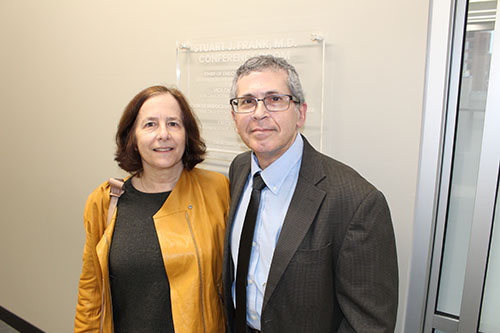 Dr. Stu Frank and his wife“When I first joined UAB, the Division of Endocrinology, Diabetes, and Metabolism Director was Jeff Kudlow. He was a basic scientist as well as a physician, so he created a great environment for physician-scientists. I was encouraged to start and grow my lab to what it became.”
Dr. Stu Frank and his wife“When I first joined UAB, the Division of Endocrinology, Diabetes, and Metabolism Director was Jeff Kudlow. He was a basic scientist as well as a physician, so he created a great environment for physician-scientists. I was encouraged to start and grow my lab to what it became.”
Frank’s lab, which was interested in growth hormone and prolactin action, received several grants and grant renewals over the years. The grants allowed Frank and his lab to publish over 150 research articles in peer-reviewed scientific journals. Frank has also authored several book chapters.
The lab established itself upstream on the translational spectrum, and Frank is proud of their novel contributions to the body of endocrinology research.
“It’s not always about that next treatment or diagnostic,” said Frank. “While it is important that we consider clinical implications, just contributing to the field in a novel way that others can build off of provides immense value as well.”
Outside of research, Frank’s passion is improving the lives of patients through his endocrinology clinic. Within this specific discipline, Frank feels as though he can treat the whole patient.
“Endocrinology is a great discipline because you can help people and explain things in a way that they understand. It is very comforting and enjoyable to be able to take care of patients with endocrine disorders,” said Frank.
When it comes to leadership
Frank has had several mentorship opportunities, from training 13 Ph.D. students to supporting the 50 or so fellows that have made their way through the Division of Endocrinology, Diabetes and Metabolism.
For Frank, it’s a gratifying opportunity and one that is exponentially impactful.
“It is an honor to mentor other scientists and clinicians,” said Frank. “Knowing that several of these Ph.D. candidates have gone on to do great things, is so gratifying. When you think about all of the people that these folks will then train and so on, your impact can be felt.”
Frank has had many formal leadership roles at UAB as well. In 2006, he was named the interim division director and in 2007 was installed as the official division director after a nation-wide search. He served as the division director for 12 years, stepping down in 2018.
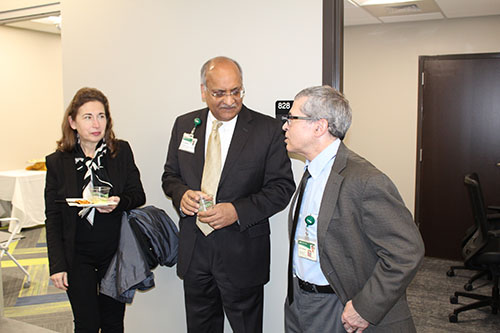 From left: Anath Shalev, Anupam Agarwal, and Stu FrankAt the Birmingham VA, he served as the endocrinology section chief for almost 20 years. Frank eventually passe d the torch to a trusted colleague, Tom Brooks Vaughn III, M.D., who he says continues to excel in leadership.
From left: Anath Shalev, Anupam Agarwal, and Stu FrankAt the Birmingham VA, he served as the endocrinology section chief for almost 20 years. Frank eventually passe d the torch to a trusted colleague, Tom Brooks Vaughn III, M.D., who he says continues to excel in leadership.
Frank also served as the interim director of the UAB Comprehensive Diabetes Center, recruiting the now Director, Anath Shalev, M.D., in 2010. In addition, he has served on several NIH study sections and will continue to serve the UAB Comprehensive Diabetes Center.
A changing landscape
Some of Frank’s favorite memories in research have been attending national and international conferences.
“Through these research conferences, I have made friends from around the world,” said Frank. “The shared intellectual pursuit allows you to make connections with others, and you are able to develop friendships with colleagues and competitors.”
But, Frank worries these fostered collegial opportunities may be shrinking.
Over the years, Frank has been able to observe trends and changes in the field of research. He says that while there is hope in AI advancements, the genomics explosion, and big data sets in biological research, there’s a unique–and growing–pressure.
“Over the last several years, we have been pressuring our scientists to bring more and more to the table in a single research article before it is accepted to the body of literature,” said Frank. “This incentivizes scientists to hold onto their data for years while they build on it, rather than share incremental releases. And, it increases the competition in the field of research.”
For Frank, research access and availability should be valued. And policies like the new NIH Data Sharing rules, while laborious, ensure that research is less siloed and more widely available for scientists to collaborate and build off one another.
Words of wisdom
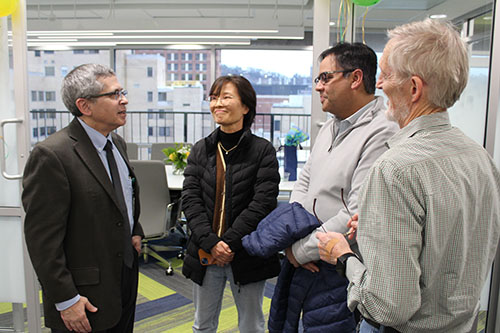 Wherever the field of research goes, Frank knows that the scientific method should continue to be the foundation for new and developing scientists.
Wherever the field of research goes, Frank knows that the scientific method should continue to be the foundation for new and developing scientists.
“It takes a village to train a scientist, and if you are well trained, you’ll go further. Ultimately, it is all about the time that you set aside for your training in research. It’s impossible to do it on the fly. You must set aside dedicated time and plan, which can be tough to convince people of with young families and financial needs.”
“It is important that physician scientists get the right toolkit together. By that I mean, if it is a wet lab, set aside protected time from clinical responsibilities. If you are in a dry lab, think about getting a master’s degree for statistics, research design, or methods.”
A message from his colleagues
Not only did colleagues honor Frank with their speeches at his conference room dedication, but several leaders from around UAB have taken a moment to submit their thoughts on the legacy of Frank at UAB as well.
“Stu Frank is the consummate physician, driven by curiosity and kindness and powered by brilliance. He cares deeply for each of his patients, seeking to understand who they are, what is happening to them, and what he and our colleagues can do for each. He inspires his students and has been selected for more than 10 Outstanding Teaching Awards by our Department and two Dean’s Awards for Excellence in Mentoring, from the Heersink School of Medicine and the UAB Graduate School. He teases apart the biochemical underpinnings of how we tick from “zeta-eta expression” – that comes from my favorite paper of his in Science – to how growth hormone and insulin-like growth factor 1 affect our biologic clocks.
Above all, Stu Frank is a great friend to this department and to each of us faculty. He provides wise counsel to many of our most junior faculty as well as to me and many chairs and deans. I am honored to recognize Stu today.” – Seth Landefeld, M.D., chair of the UAB Department of Medicine
“Dr. Stuart J. Frank has had a long and distinguished career in the field of medicine, which has spanned over several decades. With a background in both Internal Medicine and Endocrinology, Dr. Frank has honed his skills as a clinician, researcher and teacher. As a Professor Emeritus at the University of Alabama at Birmingham, he has been a central figure in the Division of Endocrinology, Diabetes and Metabolism for many years and has played a critical role in advancing the understanding of growth hormone actions and signaling.
Throughout his career, Dr. Frank has been highly regarded by his colleagues and peers, both for his exceptional scientific research and his outstanding clinical skills. He has published numerous articles in leading medical journals and has made important contributions to the field of endocrinology, diabetes and metabolism. He is also known for his exceptional teaching style and methods, which have earned him numerous teaching awards over the years.
As a mentor, Dr. Frank has had a profound impact on the careers of many aspiring physicians and has been regarded as a trusted advisor by many who have had the privilege of working with him. He is known for his honesty and integrity, as well as his consistent adherence to strong moral and ethical principles. He is a role model to many, and his contributions to the field of medicine will not be forgotten.
Dr. Frank’s dedication to his work, his students and his patients has earned him great respect and admiration throughout the medical community. His combination of scientific expertise, clinical knowledge and personal qualities have made him a well-rounded individual who has had a lasting impact on the field of medicine. His legacy as a mentor, friend and physician will continue to inspire future generations of medical professionals, and he will always be remembered as a truly remarkable individual.
In addition to his professional accomplishments, Dr. Frank is also known for his quick wit and sense of humor. He has a sharp mind and is known for his ability to make people laugh, which is a rare and much appreciated quality in the field of medicine. He brings a lightheartedness to his work, which can be challenging and demanding, and provides a much-needed break from the intensity of daily work. This makes him a beloved figure not only to his colleagues but also to his patients, who appreciate his compassionate and friendly approach. His combination of scientific expertise, clinical knowledge, personal qualities, and humor make him a well-rounded individual who has made a lasting impact in the field of medicine.” – Fernando Ovalle, M.D., director of the UAB Division of Endocrinology, Diabetes, and Metabolism.
“Dr. Stu Frank is the embodiment of a great physician-scientist. But to our Comprehensive Diabetes Center and to me, he is a lot more! He did a wonderful job as the interim center director and is the one who convinced me to come to UAB and start growing our center. (Something that I have not regretted even once.) Working closely with him as the Endocrinology Division Director and one of the Associated Directors of our Center, I greatly enjoyed his humor and sharp mind and continue to truly appreciate him as a true friend and real ‘Mensch’!” – Anath Shalev, M.D., director of the UAB Comprehensive Diabetes Center
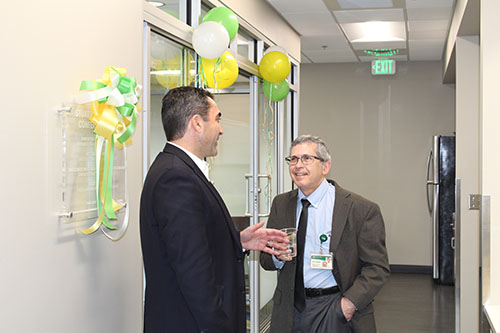 Frank and MugaveroI first met Dr. Frank as an intern in the UAB Internal Medicine residency program in 1999. His lecture on Endocrine Emergencies is the only seminar I remember from that year, because of his wit, smirk, and raised eyebrows when describing a hallmark symptom of thyroid storm, “Frank” psychosis. For decades, Stu has modelled humility and generosity as a selfless leader, mentor, and sponsor – his light-hearted humor has made him approachable, his intellect, acumen, and integrity have commanded respect. Nearly 25 years later I continue to benefit from Dr. Frank’s generosity and learn for his selfless leadership. The renovation of BDB8, the home of the Frank lab for decades, into a dynamic interdisciplinary outcomes research floor housing the COERE and faculty from 5 Divisions in the DOM was made possible because of Stu. My hope is that in the years to come we can emulate the academic curiosity, dynamic scientific discoveries, and training of the next generation of scientists in the Stuart J. Frank, MD, Conference Room, as Dr. Frank has modeled for me and so many others at UAB in this very same space that now bears his name.” -Michael Mugavero, M.D., director of the UAB Center for Outcomes and Effectiveness Research and Education
Frank and MugaveroI first met Dr. Frank as an intern in the UAB Internal Medicine residency program in 1999. His lecture on Endocrine Emergencies is the only seminar I remember from that year, because of his wit, smirk, and raised eyebrows when describing a hallmark symptom of thyroid storm, “Frank” psychosis. For decades, Stu has modelled humility and generosity as a selfless leader, mentor, and sponsor – his light-hearted humor has made him approachable, his intellect, acumen, and integrity have commanded respect. Nearly 25 years later I continue to benefit from Dr. Frank’s generosity and learn for his selfless leadership. The renovation of BDB8, the home of the Frank lab for decades, into a dynamic interdisciplinary outcomes research floor housing the COERE and faculty from 5 Divisions in the DOM was made possible because of Stu. My hope is that in the years to come we can emulate the academic curiosity, dynamic scientific discoveries, and training of the next generation of scientists in the Stuart J. Frank, MD, Conference Room, as Dr. Frank has modeled for me and so many others at UAB in this very same space that now bears his name.” -Michael Mugavero, M.D., director of the UAB Center for Outcomes and Effectiveness Research and Education
